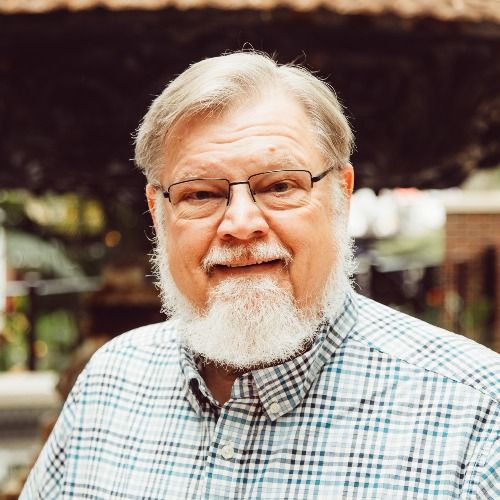Episode 866
Resistance and Grief: The Two Marys at the Tomb
The "Daily Bible Refresh" is presented each day by Rev. Dr. Brad Miller who has a goal of speaking a bit of the bible into two million ears (one million people) in three years (2025-2028).
He is the author of "The A, B, C-1,2,3 Bible Study Guide" Free to you by clicking HERE.
Brad served as a local church pastor for forty years and has a background in radio and podcasting. Moreover, he is a life-long student of The Bible.
He believes in the words of Jesus that “scripture is fulfilled in your hearing” (Luke 4:21)
The "Daily Bible Refresh" is available seven days a week by 6:00 am ET. The episodes are no longer than ten minutes long and are...
- Understandable: A reading from the New Testament (usually the Gospel) selected from the Revised Common Lectionary using "The Message" translation.
- Relatable: You will have a couple of "points to ponder" from the text which will relate to your life
- Applicable: Every episode includes a way you can take action based on the reading
- A recommended resource to help you go deeper in biblical study and spiritual direction.
- A prayer for your day.
A companion resource to the Voice of God Daily Podcast is the “ABC Bible Study Guide” available by clicking HERE.
The "Daily Bible Refresh" is available every day at VoiceofGodDaily.com on Apple Podcasts, Spotify and all major podcast directories.
You can help Dr. Brad attain his goal of getting a bit of the bible into two million ears by subscribing to "Daily Bible Refresh" on Apple Podcasts, leaving a five-star rating, and writing a review. More importantly please share with your network of family and friends about the "Daily Bible Refresh".
Please make listening to the "Daily Bible Refresh" a part of your daily life.
Remember… “All scripture is God-breathed and useful”(2 Timothy 3:16)
The examination of Matthew 27:57-66 offers a profound exploration of grief's political nature amid the backdrop of Jesus's crucifixion. As Joseph of Arimathea bravely claims Jesus's body, he initiates a dialogue about the intersection of personal loss and societal obligation. This act, while deeply personal, resonates with broader themes of justice and responsibility, challenging each of us to consider how we respond to the suffering of others. The two Marys, who remain at the tomb, symbolize resilience in the face of despair, illustrating that public expressions of grief can serve as acts of defiance against societal norms that often seek to marginalize such emotions. Their vigil is a testament to the idea that mourning can transcend personal sorrow, evolving into a collective protest against injustice.
Delving deeper, the narrative also scrutinizes the dynamics of wealth and privilege as illustrated by Joseph's actions. Initially a secret disciple, Joseph's decision to step into the public sphere exemplifies the potential of individuals to utilize their resources for the greater good. His story prompts a critical examination of our own privileges and the ways in which we can leverage them to advocate for justice. The episode encourages listeners to reflect on how they might embody Joseph's courage in their own lives, extending beyond mere acknowledgment of injustice toward active participation in the fight for equity and support for marginalized communities.
Finally, the futile attempts of the authorities to control the narrative surrounding Jesus's death highlight the desperation of oppressive systems in their quest to maintain power. The sealing of the tomb and the deployment of guards symbolize a larger struggle between oppressive forces and the transformative power of love and justice. This narrative arc serves as a reminder that, despite the constraints imposed by systemic authority, hope and liberation ultimately prevail. The discussion culminates in a call to action, urging individuals to recognize their potential to effect change through acts of solidarity and support, thereby embodying the very essence of love that transcends even the most formidable barriers.
Takeaways:
- The tension between death and possibility is a significant theme within this scripture narrative.
- The presence of the two Marys signifies a profound form of resistance against patriarchal structures.
- Joseph of Arimathea demonstrates how wealth and privilege can be utilized for justice and support.
- The futile attempts of authorities to control the tomb illustrate the limitations of oppressive power.
- Grief itself can serve as a political act, bearing witness to injustices in society.
- We are encouraged to reflect on how we can use our own resources for justice and service.
Links referenced in this episode:
Transcript
Brad Miller.
Speaker A:Hello good people.
Speaker A:Welcome to Daily Bible Refresh with Dr.
Speaker A:Brad Miller.
Speaker A:So glad you joined me and the mission that I have to to get the audible word of God into 2 million years.
Speaker A: That's a million people by: Speaker A:We do that by a daily reading of the New Testament.
Speaker A:We use the Revised Common Lectionary, where in year C, we're in the Lenten season, the day before Easter.
Speaker A:We make the Bible both understandable, relatable and applicable.
Speaker A:And we bring it all to you in about 10 minutes or so.
Speaker A:It's all brought to you by Voice of God Daily, which is our website where you can find the free gift for the ABC 1, 2, 3 Bible study method.
Speaker A: eading for today from Matthew: Speaker A:His name was Joseph.
Speaker A:He went to Pilate and asked for Jesus's body, and Pilate granted his request.
Speaker A:Joseph took the body and wrapped it in clean linens and put it in his own tomb, a new tomb only recently cut into the rock and rolled a large stone across the entrance.
Speaker A:Then he went off.
Speaker A:But Mary Magdalene and the other Mary stayed, sitting in plain view of the tomb.
Speaker A:After sundown, the high priest and Pharisees arranged a meeting with Pilate, and they said, sir, we just remembered that that liar announced while he was still alive.
Speaker A:After three days I will be raised.
Speaker A:We've got to get that tomb sealed.
Speaker A:Until the third day.
Speaker A:There's a good chance his disciples will come and steal the corpse.
Speaker A:And they go around saying, he's risen from the dead.
Speaker A:Then we'll be worse off than before.
Speaker A:A final deceit surpassing the first.
Speaker A:Pilate told them, you will have a guard.
Speaker A:Go ahead and secure it the best you can.
Speaker A:So they went out and secured the tomb, sealing the stone and posting guards.
Speaker A:Powerful passage of Scripture here that really sets the stage for what is to come.
Speaker A:This is about the tension between death and possibility, between one power's attempt to control and love's persistent power.
Speaker A:Let's talk about some points to ponder.
Speaker A:The first one has to do with what we might call the politics of grief.
Speaker A:The presence of the two Marys here, it says they are sitting in plain view of the tomb, is an act of profound resistance in a patriarchal society that often relegated women.
Speaker A:How they could express grief, their public vigil challenges the power structures that were in place.
Speaker A:They remind us that grief itself can be political, that bearing witness to injustice, refusing to look away, is a form of protest.
Speaker A:Their persistence echoes in movements today where communities gather to mourn those killed by state violence.
Speaker A:A second point is about wealth and social responsibility.
Speaker A:Joseph of Arimathea used his privilege, both his wealth and his status, to serve justice.
Speaker A:While he had previously been a secret disciple for fear of the authorities, is what it says in the Gospel of John, he now steps forward publicly, and this challenges us to consider how those with privilege can move beyond comfort and safety to actively support movements for justice, even at great personal risk.
Speaker A:One more point.
Speaker A:It's about the empire's futile control.
Speaker A:The authorities attempt to seal and guard the tomb reveals how systems of power respond to transformative movements with surveillance and force and attempts at control, even violence.
Speaker A:Yet, as we know, their efforts often prove futile.
Speaker A:This speaks to how an empire often responds to liberation movements.
Speaker A:It reminds us that love and justice ultimately cannot be contained by force.
Speaker A:Let's talk about an action step.
Speaker A:Identify some ways that you can show up for justice using whatever privilege or resources that you have.
Speaker A:They might be your financial resources, support organizations that support and are led by marginalized communities, or offering in your space that you have some say about, some space for some movements to organize, or maybe standing vigil in grief with someone in protest, or maybe using your institutional access to advocate for change.
Speaker A:What is your equivalent of Joseph of Arimathea's tomb?
Speaker A:That is a resource that you can use for service and justice.
Speaker A:We're going to pray here in just a moment.
Speaker A:I always want to let you know that we have a great resource for you to help you in your own daily Bible study.
Speaker A:We love it when you come and join us here every day at Daily Bible Refresh for the audible word of God.
Speaker A:But I think you know you need to read the word of your own accord.
Speaker A:So please just go over to voiceofgoddaily.com and there we've prepared for you a free resource that will help you in your daily Bible study.
Speaker A:It's the ABC 1, 2, 3 Bible study method.
Speaker A:It's just that straightforward.
Speaker A:ABC 123.
Speaker A:Pick it up at voiceofgod daily.com let's pray.
Speaker A:Oh God, you are a divine presence who sits with us in grief and moves us toward liberation.
Speaker A:Be with us now when we're tempted to turn away from places of pain.
Speaker A:Give us courage like the two Marys to keep vigil when we're afraid to use our privilege for justice Inspire us, like Joseph, to take faithful risk.
Speaker A:When Empire's powers try to contain hope, remind us that love cannot be sealed up by any tomb.
Speaker A:Thank you for showing us that waiting can be resistance, that grief can be protest, and that every resource we have can serve liberation.
Speaker A:Help us be people who dare to sit with death while trusting in transformation.
Speaker A:In the spirit of Jesus whose life and love could not be contained, we pray.
Speaker A:Amen.
Speaker A:Well, thank you for being with me here today here in this Lenten season.
Speaker A:Tomorrow we celebrate Easter Sunday and I hope that you'll be with me on that day as well.
Speaker A:Be with me every day as we come to you here at the Daily Bible Refresh.
Speaker A: ionaires, a million people by: Speaker A:Please join me on Easter and bring a friend and we will share the scripture time together.
Speaker A:Until then, remember that God's loyal love doesn't run out.
Speaker A:His merciful love hasn't dried up, it's created new every morning.



